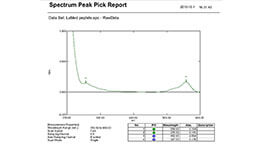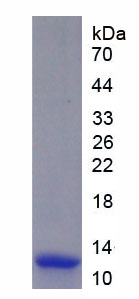Eukaryotic Macrophage Inflammatory Protein 1 Alpha (MIP1a) 

CCL3; MIP1-A; SCYA3; Chemokine C-C-Motif Ligand 3; Small Inducible Cytokine A3; Homologous To Mouse Mip-1a; Tonsillar Lymphocyte LD78 Alpha Protein
- UOM
- FOB US$ 212.00 US$ 530.00 US$ 1,060.00 US$ 3,180.00 US$ 7,950.00
- Quantity
Overview
Properties
- Product No.EPA092Ca61
- Organism SpeciesCanis familiaris; Canine (Dog) Same name, Different species.
-
Applications
Positive Control; Immunogen; SDS-PAGE; WB.
If bio-activity of the protein is needed, please check active protein.
Research use only - DownloadInstruction Manual
- CategoryCytokineInfection immunity
- Source Eukaryotic expression, Host 293F cell
- Endotoxin Level<1.0EU per 1µg (determined by the LAL method)
- Subcellular LocationSecreted
- Molecular Mass 9.8kDa, Accurate 11kDa(Analysis of differences refer to the manual)
- Residues & TagsSer19~Ala92 with N-terminal His Tag
- Buffer FormulationPBS, pH7.4, containing 5% Trehalose.
- Traits Freeze-dried powder, Purity > 90%
- Isoelectric Point8.2
Share your citation
Upload your experimental result
Review
Leave a message
Loading...
Sign into your account
Share a new citation as an author
Upload your experimental result
Review
Please attach serial No. on instruction manual


Contact us
Please fill in the blank.
Name*
Organization
Address
E-mail address*
Telephone
Inquiry*
Verification code*

Sequence

Usage
Reconstitute in 10mM PBS (pH7.4) to a concentration of 0.1-1.0 mg/mL. Do not vortex.
Storage
Avoid repeated freeze/thaw cycles. Store at 2-8°C for one month. Aliquot and store at -80°C for 12 months.
Stability
The thermal stability is described by the loss rate. The loss rate was determined by accelerated thermal degradation test, that is, incubate the protein at 37°C for 48h, and no obvious degradation and precipitation were observed. The loss rate is less than 5% within the expiration date under appropriate storage condition.
Increment services
-
 BCA Protein Quantification Kit
BCA Protein Quantification Kit
-
 Protein Labeling Customized Service
Protein Labeling Customized Service
-
 Molecular Mass Marker for Protein
Molecular Mass Marker for Protein
-
 Monoclonal Antibody Customized Service
Monoclonal Antibody Customized Service
-
 Polyclonal Antibody Customized Service
Polyclonal Antibody Customized Service
-
 Protein Activity Test Experiment Service
Protein Activity Test Experiment Service
-
 Immunoprecipitation (IP) Experiment Service
Immunoprecipitation (IP) Experiment Service
-
 Electrophoretic Mobility Shift Assay (EMSA) Experiment Service
Electrophoretic Mobility Shift Assay (EMSA) Experiment Service
-
 Buffer
Buffer
-
 Lentivirus Packaging Experiment Service
Lentivirus Packaging Experiment Service
-
 Adenovirus Packaging Experiment Service
Adenovirus Packaging Experiment Service
-
 Real Time PCR Experimental Service
Real Time PCR Experimental Service
-
 Spike RBD Protein (S-RBD)
Spike RBD Protein (S-RBD)
-
 Protein G
Protein G
-
 Protein A
Protein A
Citations
- Age influence on hypersensitivity pneumonitis induced in mice by exposure to Pantoea agglomeransPubmed: 24044680
- The Transcriptional Foundations of Sp110-mediated Macrophage (RAW264. 7) Resistance to Mycobacterium tuberculosis H37RaPubmed:26912204
- CIRCULATING MACROPHAGE INFLAMMATORY PROTEIN-1 ALPHA (MIP1-Α) AS A POTENTIAL BIOMARKER FOR THE DIAGNOSIS OF PATIENTS WITH …57e97ac908aeb34bc08fd41a.pdf
- Role of Gut-Derived Endotoxin on Type I Collagen Production in the Rat Pancreas after Chronic Alcohol Exposure pubmed:29121396
- Changes in the concentrations of inflammatory and oxidative status biomediators (MIP-1 α, PMN elastase, MDA, and IL-12) in depressed patients with and without posttraumatic stress disorder10.1016/j.pharep.2017.08.008
- Molybdenum disulfide/graphene oxide nanocomposites show favorable lung targeting and enhanced drug loading/tumor-killing efficacy with improved …Articles:am2017225
- Therapeutic Potential of Pien Tze Huang on Experimental Autoimmune Encephalomyelitis RatPubmed:29682587
- Cathelicidin LL-37 affects surface and intracellular Toll-like receptor expression in tissue mast cellsPubmed:29670923
- Changes in the concentrations of inflammatory and oxidative status biomediators (MIP-1 α, PMN elastase, MDA, and IL-12) in depressed patients with and without …Pubmed:29339257
- CQPC06 Activity Prevents Dextran Sulfate Sodium‐Induced Colitis by Regulating the IL‐8 PathwayDoi: 10.1111/1750-3841.14346
- The anti-inflammatory and anti-oxidative effects of conbercept in treatment of macular edema secondary to retinal vein occlusionPubmed: 30558792
- Intravitreal conbercept improves outcome of proliferative diabetic retinopathy through inhibiting inflammation and oxidative stressPubmed: 33227274
- α-Galactosylceramide and its analog OCH differentially affect the pathogenesis of ISO-induced cardiac injury in micePubmed: 32973325
- PIGU promotes hepatocellular carcinoma progression through activating NF-κB pathway and increasing immune escapePubmed: 32971102
- A vaccine-based nanosystem for initiating innate immunity and improving tumor immunotherapyPubmed: 32332752
- PDIA6 promotes pancreatic cancer progression and immune escape through CSN5-mediated deubiquitination of β-catenin and PD-L134325342








